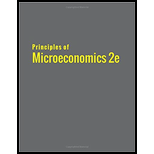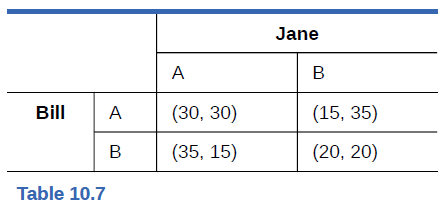
Jane and Bill are apprehended for a bank robbery. They are taken into separate rooms and questioned by the police about their involvement in the crime. The police tell them each that if they confess and turn the other person in, they will receive a fighter sentence. If they both confess, they will be each be sentenced to 30 years. If neither confesses, they will each receive a 20-year sentence. If only one confesses, the they will receive 15 years and the one who stayed silent will receive 35 years. Table 10.7 below represents the choices available to Jane and Bill. If Jane trusts Bill to stay silent, what should she do? If Jane thinks that Bill will confess, what should she do? Does Jane have a dominant strategy? Does Bill have a dominant strategy? A = Confess; B = Stay Silent. (Each results entry lists Jane’s sentence first (in years), and Bill’s sentence second.)

Trending nowThis is a popular solution!

Chapter 10 Solutions
PRINCIPLES OF MICROECONOMICS (OER)
Additional Business Textbook Solutions
Horngren's Cost Accounting: A Managerial Emphasis (16th Edition)
Financial Accounting (12th Edition) (What's New in Accounting)
Principles of Accounting Volume 1
Managerial Accounting (5th Edition)
Principles of Management
Managerial Accounting (4th Edition)
- Jane and Bill are apprehended for a bank robbery. They are taken into separate rooms and questioned by the police about their involvement in the crime. The police tell them each that if they confess and turn the other person in, they will receive a lighter sentence. If they both confess, they will be each be sentenced to 30 years. If neither confesses, they will each receive a 20-year sentence. If only one confesses, the confessor will receive 15 years and the one who stayed silent will receive 35 years. Table 10.7 e below represents the choices available to Jane and Bill. A = Confess; B = Stay Silent. (Each results entry lists Bill's sentence fırst (in years), and Jane's sentence second). Answer the following: Jane A B A (30, 30) (15, 35) Bill (35, 15) (20, 20) Table 10.7 a) If Jane trusts Bill to stay silent, what should she do? b) If Jane thinks that Bill will confess, what should she do? c) Does Jane have a dominant strategy? Does Bill have a dominant strategy? Justify your answer.arrow_forwardJane and Bill are apprehended for a bank robbery. They are taken into separate rooms and questioned by the police about their involvement in the crime. The police tell them each that if they confess and turn the other person in, they will receive a lighter sentence. If they both confess, they will be each be sentenced to 30 years. If neither confesses, they will each receive a 20-year sentence. If only one confesses, the confessor will receive 15 years and the one who stayed silent will receive 35 years. The table below represents the choices available to Jane and Bill. If Jane thinks that Bill will confess, what should she do? A = Confess; B = Stay Silent. (Each results entry lists Janes's sentence first (in years), and Bill's sentence second.)arrow_forwardThe police have apprehended two suspects for a crime. Since they don't have enough information to convict, they decide to extract a confession from them by putting each suspect in a separate room and offering them the following deal: "If you Confess and your partner doesn't, I can promise you a reduced (one-year) sentence, and on the basis of your confession, your partner will get 10 years. "If you both Confess, you will each get a three-year sentence." Each suspect also knows that if neither of them confesses, the lack of evidence will cause them to be tried for a lesser crime for which they will receive two-year sentences. A player strategy in this game would be for: O these are all possible strategies O stay silent if the other player stays silent O confess no matter what the other player does confess if the other player confessesarrow_forward
- Tom and Jerry are each given one of two cards. One card is blank, while the other has a circle on it. A player can draw a circle on the blank card or erase the circle on one that has already been drawn. Tom and Jerry make their decision separately and hand in the card at the same time.Nobody wins anything unless the two cards are handed in with one and only one circle on them. The player who hands in the card with the circle receives $20, while the one who hands in the blank card receives $10. Answer the following questions. (1) Represent the game in strategic form.(2) Find the Nash equilibria of the game (in pure strategies).arrow_forwardJohn and Paul are walking in the woods one day when suddenly an angry bear emerges from the underbrush. They each can do one of two things: run away or stand and fight. If one of them runs away and the other fights, then the one who ran will get away unharmed (payoff of 0) while the one who fights will be killed (payoff -200). If they both run, then the bear will chase down one of them and eat them to death but the other one will get away unharmed. Assuming they don't know which one will escape we will call this a payoff of -100 for both. If they BOTH fight, then they will successfully drive off the bear but they may be injured in the process (payoff -20). Construct a payoff matrix for this game and identify the pure strategy Nash equilibrium. (Indicate it with words not with a circle!)arrow_forward3.4 Bernie and Leona were arrested for money laundering and were interrogated separately by the police. Bernie and Leona were each presented with the following independent offers. If one confesses and the other doesn't, the one who confesses will go free and the other will receive a 20-year prison sentence; if both confess, each will receive a 10-year prison sentence. Bernie and Leona both know that without any confessions, the police only have enough evidence to convict them of the lesser crime of tax evasion, and each would then receive a 2-year prison sentence. a. Use the information to construct a payoff matrix for Bernie and Leona. b. What is the dominant strategy for Bernie and for Leona? Why? c. Based on your response to the previous question, what prison sentence will each receive?arrow_forward
- Consider a bilateral relationship between an employer and employee, where the output of the firm, q, depends on the effort level, e, exerted by the worker. The probability of occurring is conditional on the effort level of the worker, i.e. Prob = [q = q¡le] = P;(q)V i = {1,2,.,n}. The employer has a VNM utility function given by G(q – w). where W is the wage paid to the worker, while the worker's VNM utility function is given by U(w, e) = u(w) – d(e). The worker has a fallback utility of U. What does it mean to say that information about the worker's effort level is symmetric? b. Solve the employer's maximization problem when information is symmetric. In your answer motivate why the participation constraint binds. c. If information is symmetric, what type of contract should the employer offer if (i) he is risk neutral and the worker is risk averse; (ii) if he is risk averse and the worker is risk а. neutralarrow_forwardSusan and Thomas are playing a one-shot simultaneous move game an infinite time horizons. The payoffs matrix of the game played at each time period is Thomas R (3, 3) (13, 0) Susan (0, 13) (8,8) R. where the first number in each cell is the payoff to Susan and the second number is the payoff to Thomas. A trigger strategy of playing the Nash equilibrium forever if either agent deviates from the cooperative agreement will result in (R, R) being played at every time period so long as both agents' discount factors exceed: Checkarrow_forwardC) Two people are suspected of robbing a bank. They are being interrogated in separate rooms. If both stay silent, they can be convicted of a lesser crime and sentenced to only 8 months. If one agreeds to confess that they did it together, he can plea bargain a suspended sentence while the other is convicted to 5 years in prison. If both confess that they did it together, each will receive a 3 year prison term. Create a payoff matrix from the point of view of the first suspect. Find the Nash equilibrium strategies for both suspects in this game.arrow_forward
- Two partners start a business. Each has two possible strategies, spend full time or secretly take a second job and spend only part time on the business. Any profits that the business makes will be split equally between the two partners, regardless of whether they work full time or part time for the business. If a partner takes a second job, he will earn $20,000 from this job plus his share of profits from the business. If he spends full time on the business, his only source of income is his share of profits from this business. If both partners spend full time on the business, total profits will be $200,000. If one partner spends full time on the business and the other takes a second job, the business profits will be $80,000. If both partners take second job, the total business profits are $20,000. a) This game has no pure strategy Nash equilibria, but has a mixed strategy equilibrium. b) This game has two Nash equilibria, one in which each partner has an income of $100,000 and one in…arrow_forwardProfessor can give a TA scholarship for a maximum of 2 years. At the beginning of each year professor Hahn decides whether he will give a scholarship to Gong Yi or not. Gong Yi can get a scholarship in t=2, only if he gets it in t=1. Basically, the professor and TA will play the following game twice. TA can be a Hardworking type with probably 0.3 and can be a Lazy type with a probability of 0.7. Professor does not know TA's type. If TA is hard working, it will be X=5 and TA will always work if he gets a scholarship. If TA is lazy, it will be X= 1. There is no time discount for t=2. Find out a Perfect Bayesian Equilibrium of the game.arrow_forwardWhile grading a final exam a professor discovers that two students have virtually identical answers. She talks to each student separately and tells them that she is sure that they shared answers, but she cannot be sure who copied from whom. She offers each student a deal-if they both sign a statement admitting to the cheating, each will be given an F for the course. If only one signs the statement, that student will be allowed to withdraw from the course and the other nonsigning student will be expelled from the university. Finally, if neither signs the statement they will both get a C for the course because the professor does not have enough evidence to prove that cheating has occurred. Assuming the students are not allowed to communicate with one another, set up the relevant payoff matrix. Beth doesn't sign Beth signs Beth: (Click to select) v Bob: (Click to select) v Beth: (Click to select) Bob: (Click to select) v Bob signs Beth: (Click to select) v Bob doesn't sign Bob: (Click to…arrow_forward
 Managerial Economics: A Problem Solving ApproachEconomicsISBN:9781337106665Author:Luke M. Froeb, Brian T. McCann, Michael R. Ward, Mike ShorPublisher:Cengage Learning
Managerial Economics: A Problem Solving ApproachEconomicsISBN:9781337106665Author:Luke M. Froeb, Brian T. McCann, Michael R. Ward, Mike ShorPublisher:Cengage Learning
